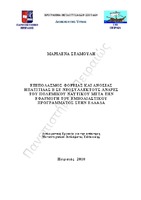Επιπολασμός φορείας και ανοσίας ηπατίτιδας Β σε νεοσύλλεκτους άνδρες του Πολεμικού Ναυτικού μετά την εφαρμογή του εμβολιαστικού προγράμματος στην Ελλάδα
Prevalence of hepatitis B and immunity among naval recruits after the implementation of the vaccination program in Greece

View/
Subject
Ηπατίτιδα ; Hepatitis ; Εμβολιασμός ; VaccinationAbstract
Hepatitis B virus (HBV) infection is a global healthcare problem and is associated with increased morbidity and mortality. In particular, over 350 million people are chronically infected worldwide. Moreover, it is estimated that over 250,000 patients worldwide die annually from HBV sequelae such as cirrhosis and hepatocellular carcinoma. The endemicity of hepatitis B is described by the prevalence of HBsAg in the general population of a defined geographical area, and it varies considerably globally: HBsAg prevalence of more than 8% is typical in highly endemic areas, prevalence of 2-7% is found in areas of intermediate endemicity, whereas in areas with low endemicity less than 2% of the population is HBsAg positive. In this Master's thesis, we study several aspects related to the endemicity of hepatitis B and elaborate on a wide variety of factors that make the disease very difficult to manage. Furthermore, since hepatitis B has long been a serious public health problem in Greece, we analyze statistically the prevalence of hepatitis B in a sample of 1000 Greek Naval recruits aged between 18 and 28, in order to estimate the effectiveness of the compulsory vaccination program introduced in Greece in 1998.


